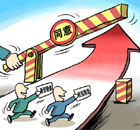Op-Ed Contributors
Urbanization process should be coordinated
By Chan Choi Hi (China Daily)
Updated: 2010-01-13 07:58
 |
Large Medium Small |
Suggestions to promote urbanization at the 2009 Central Economic Work Conference likely mean that urbanization will play an important role in the new era of China's economic development. Policy measures focusing on urbanization will have a profound impact on the Chinese economy and society.
However, if we only see the benefits of urbanization, we neglect its downsides that urbanization might turn out to be a nightmare.
Government departments know the problems caused by China's urbanization and they have tried to resolve these issues.
|
||||
The conference proposed to coordinate urban development but the level of urbanization in China must be improved. Urban planning, the improvement for urban management and the development of communities need to be considered with a new path of thinking.
In December, the Central Rural Work Conference was held in Beijing and many opinions were discussed, mainly focusing on efforts to increase coordination between urban and rural development, which is one of the issues that the CPC Central Committee and the State Council have both centered on.
In the coming years, authorities will take into account expanding demand for work on rural infrastructure. They will likely take steps to coordinate cohesive development between urbanization and rural development as a strategic goal.
This is also one of the keys of rural reform and it's clear that the Central Rural Work Conference shares similar ideas with officials at the Central Economic Work Conference.
To steadily promote urbanization, eligible residents in rural areas must first gradually settle down in urban areas. The influx into cities will lead to an expansion of urban population and this could give way to a series of social issues, such as environmental pollution, employment, education and healthcare. Safeguarding the interests and rights of the rural population and reducing social conflicts are very important issues.
By the end of 2008, China's urbanization rate was 45 percent. And though urbanization is still in the developmental stage, if we want to push the process forward, it is necessary to explore a path right for China's national conditions.
Farmers make up 63 percent of the Chinese population. But to solve the social problems that will be the consequences of the rural migration, China should not sacrifice the qualities of the environment and of life. We must adhere to the principles of sustainable development and we should conserve resources.
In the process of urbanization we cannot ignore the development of rural areas. On the contrary, we should devote more resources to support rural development. Harmonious coexistence of urban and rural areas is the purpose of building a harmonious society. Rural areas are always our "fall-back" position. Urban and rural areas should go hand-in-hand.
In China, we still have 700 million farmers. There is still no magic formula on how many people should be urbanized. It is a pity that the departments concerned have not drawn up a comprehensive plan for the sustainable development of rural areas. To start with, support of rural areas should first be addressed, especially remote areas where medical and technological support is urgently needed. We should start up "Remote Support Centers" as soon as possible. The centers should directly provide support to farmers and also advocate a sustainable rural development.
The author is District Councillor of Central & Western District Council, HKSAR.
(China Daily 01/13/2010 page8)













